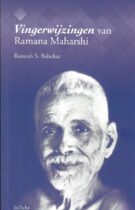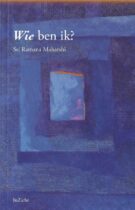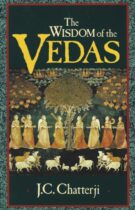Vingerwijzingen van Ramana Maharshi
Door Ramesh S. Balsekar (1917 – 2009), vertaling door Mieke Berger.
96 Pagina’s | 2008 | Paperback | Uitgeverij Inzicht, Hillegom | ISBN: 9789077908006.
Oospronkelijke titel: Pointers from Ramana Maharshi.
Ramana Maharshi, de wijze van Arunachala gaf er de voorkeur aan om in stilte te onderrichten. Als hij woorden gebruikte, dan deed hij dat spaarzaam en met een groot dramatisch effect, Wat de meeste indruk maakte, was de autoriteit waarmee hij zijn diepe kennis naar buiten bracht.
Hoeveel alles wat Sri Ramana Maharshi verkondigde vol betekenis was, moest men zijn uitspraken goed op zich laten inwerken en interpreteren om de kern van zijn leer goed te bevatten. Hardnekkig focussen op wat hij als onderricht gaf was een voorwaarde. Dit boek is anders, zelfs voor wie al veel boeken van Sri Ramana Maharshi heeft gelezen. De inhoud van dit boek legt de nadruk op het ultieme geluk, dat ieders ware natuur is.
Het is de meest compacte en toegankelijke tekst die beschikbaar is van Sri Ramana Maharshi, met aanvullindgen en annotaties van Sri Ramesh S. Balsekar, van wie bekend is dat hij advaita voor de westerse geest buitengewoon duidelijk heeft kunnen uitleggen.
Wie ben ik?
Door Sri Ramana Maharshi (1879–1950), vertaling door M.F.W. Berger Ph.D en J. Kramer Schippers.
23 Pagina’s | 2009 | Paperback | Uitgeverij Inzicht, Hillegom | ISBN: 9789077908020.
Oorspronkelijke titel: Who am I?
De weg naar Inzicht en Bevrijding is eenvoudig en behoeft weinig woorden. Alles wat er meer gezegd of geschreven wordt dan in deze tekst is verwoord, leidt af en kan aanleiding zijn tot verwarring en misverstand. De compacte, directe en heldere taal brengt ons direct naar de essentie van het bestaan. De tekst ‘Wie Ben Ik?‘ functioneert als een geheugensteun en is daarmee een belangrijke inspiratiebron, die de richting wijst naar Inzicht en Bevrijding.
The Mind of Adi Shankaracharya
By Y. Keshava Menon.
121 Pages | Published in 1976 | Jaico Publishing House, India | No ISBN.
On the intellectual level, Indian philosophy is logical and rational and proceeds on the same kind of axioms, overt or implied, as Western philosophy. Shankara was one of the most subtle of Indian philosophers, and though for him intellectual dexterity was not an end in itself, the reader will find some reasoning worthy of his steel in the following pages. Equally, however, it would be an error to bring to Shankara the same spirit of mesmerised reverance that many Christians bring to the Elizabeth English of the Authorised Version of the Bible. Reverence and blind faith are also not enough. Perhaps the most helpful thing that can be said is that the reader who wants to get the best out of Shankara should approach him with a cool, constructively critical mind, but determined to study philosophy as a whole and not to reject conclusions out of hand. There is ratiocination in plenty for him, but if he is not prepared to test the philosophy for himself, he would have gained little from Shankara.
From the Introduction (p. VII):
” Though he is considered one of the foremost of India’s philosophers, Shankara is also one of the most misunderstood. We have heard fire-eating revolutionaries advance the theory that the essence of Shankara philosophy is on all fours with the materialistic interpretation of life formulated by Hegel, on which is built the edifice of Marxism. Pandit Jawarharlal Nehru, in the course of his record of the cultural history of the world, testifies to Shankara’s merits as an outstanding Shaivite. In his own time, Shankara was hailed as Shanmathatshapanacharya (founder of six faiths). Obviously, all of them cannot very well be right. Much of the misunderstanding of Shankara’s position may be due to the absence of a lucid presentation of his life and works in a comprehensive and readable form. This short monograph is an attempt to meet that need for the benefit of those, who have no previous acquaintance with philosophy. “
Viveka-Cudamani or Crest-Jewel of Wisdom of Śrī Samkarācārya
Text in Devanāgarī and translation by Mohini Mohun Chatterji (1858 – 1936).
228 Pages | First edition 1932, 2nd to 5th reprints 1947 – 1983, 6th reprint 1995, 7th reprint 1999 | Hardcover | The Theosophical Publishing House, Adyar | ISBN: 8170592526.
The English translation appeared for the first time in Vols. VII (1885 – 18886 and IX (1887 – 1888) of The Theosophist.
Vivekachudamani literally means ‘crest jewel of wisdom’. It is an important work of Śrī Samkarācārya, one of the greatest sages of Ancient India. Endowed with lofty and sharp intellect, he wrote many incisive commentaries on great standard works of Hindu philosophy. But they are beyond the reach of those, who have not attained a high proficiency in Sanskrit and other collateral philosophical disciplines. Here in Vivekachudamani he distils the quintessence of what he taught, that is, the non-dual or Vedanta or Advaita Vedanta in easy Sanskrit verses, whose sublimity of content is matched only by their lyrical beauty. Each verse is presented here with a free-running English translation.
Vedanta Sidhanta Bheda
By Narmadashankar-Devshankarmehta.
125 Pages | Published in 1985 | Hardcover | S.N. Publications | No ISBN.
An Account of Followers of the Sankarācārya School.
The book deals with the doctrinal differences among various followers of Sankarācārya School – the component of Advaita metaphysics. The study is divided into four Chapters based upon the four headings under which the subject matter of Vedānta naturally falls. Chapter I deals with Categories of Vedānta Brahma, Māyā, Jiva and Jagat, Chapter 2 reviews the harmony of Physics and Metaphysics. Chapter 3 recounts the means of realizing Brahman. Chapter analyses the theory liberation – the ultimate aim of man’s existence.
The book is systematically arranged. Each chapter is divided into sections and subsections, indicative of differences of the ācāryas in regard to their respective doctrines. The work is based upon the Siddhantalesa of Appaya Diksita. Other works have also been consulted and the results obtained. The author has taken care to avoid personal reflections on the Comparative merits of various doctrinal differences. The upholders of differences are allowed to speak in their own words, rendered into English, so that the reader might impartially grasp their views.
From the Introductory Remarks (p. VII):
” ‘Know Thyself’ is the ultimate appeal of all the orthodox and heterodox systems of Indian Philosophy. Inquiry into the Nature of Self was a stirring principle in the Indian soil, which has put to motion all the reflective minds from ancient times. The great cosmological hymn of the Rigveda, which is so much celebrated for the loftiness and uniqueness of its thought is one of the so many links of a long chain of philosophical Compositions of the pre-Rigvedic Aryas, which have survived the lapse of 3.000 years. The Rigveda – the most ancient repository of Indian thought and culture – presents a grave picture of a Rishi relflecting upon the cause of the universe and the problems of life. His speculations will, no doubt, excite the sneer of a matter-of-fact man of the nineteenth century. But a man, who cares to discern the beauty of ancient literature, should follow the sound piece of advice given by Hume: ‘Nor is it ever permitted to judge of the civility or Wisdom of any people, or even single persons, by the grossness or refinement of their theological principles. On this account, all the absurdities of the pagan system of theology must be overlooked by every critic, who would pretend to form a just notion ancient poetry’. Thus, there is no wonder when one Rishi says, that the universe is born of the great golden egg. “
Theosofie in de Qabbālāh
Door Grace F. Knoche (1909 – 2006).
183 Bladzijdes | Gepubliceerd in 2006, Nederlandse vertaling 2007 | The Theosophical University Press Agency, Den Haag | ISBN: 9789070328702.
Engelse vertaling: Theosophy in the Qabbālāh | Theosophical University Press, Pasadena California U.S.A. | ISBN: 9781557001832.
Wat zijn de essentiële leringen van de Qabbālāh, de Joodse esoterische wijsheid, die gedurende duizenden jaren van leraar aan leerling is overgedragen? In deze heldere presentatie richt Grace F. Knoche zich op de belangrijkste qaballistische thema’s: de emanatie van het heelal, de Sefiroth-levensboom en zijn symboliek in verband met de kosmos en de mens, de Vier Werelden van Schepping, de Vier Adams of Hemelse Archetypen, en de samengestelde structuur van ons wezen in relatie tot slaap, dood en inwijding. Om de betekenis ervan te verduidelijken vergelijkt de schrijfster qaballistische begrippen en symbolen met equivalenten in de hedendaagse Theosofie, vooral in de werken van H.P. Blavatsky en G. de Purucker., waaruit blijkt dat de Qabbālāh een van de stromen is van de universele Wijsheid-traditie van de mensheid.
Hoewel Theosofie in de Qabbālāh met wetenschappelijke nauwkeurigheid is geschreven, richt het zich op een breed publiek. Het boek schetst de hoofdlijnen van de qabbalistische filosofie en besteedt aandacht aan de diepere betekenis achter de specialistische terminologie ervan.
Uit Hoofdstuk 10: ‘De Viervoudige Aard van de Mens’ (blz. 124):
” De Reïncarnatieleer verschijnt in de Zohar als de leer over de ‘gilgūlīm’ (wielen), de omwenteling van de Zielen, maar meer impliciet dan expliciet. Ook wordt gesuggereerd dat voor de geboorte alles in Goddelijke vorm bestaat. Qabballisten denken dat de Ziel na de dood door een reeks wervelingen gaat, wat zowel geldt voor de transmigratie van de fysieke en andere atomen als voor de wederbelichaming van Zielen (vgl. GL:627-8vn). De Ziel trekt gewaden aan overeenkomstig de sfeer, die zij zal binnengaan. Voor de geboorte draagt ze een omhulling van hoger licht (ōr). Alles is verborgen in de Goddelijke vorm voor deze wordt geboren: de Ziel is dus een uitdrukking van haar vroegere karma, dat zich in haar Goddelijke vorm bevindt. Alle vormen van de aardse wereld werden in de Hof van Eden, de woonplaats van heilige geesten, oorspronkelijk gemaakt uit Goddelijk licht. “
The Wisdom of the Vedas
By J.C. Chatterji.
151 Pages | First Quest Edition 1980, revised edition 1992 | Softcover | Quest Books, U.S.A. | ISBN: 0835606848.
- How did the universe come into being?
- What is the nature of God?
- What is the nature of the human spirit?
- How can one gain mastery over the mind?
- What is yoga?
- What in us transcends death?
All who seek understanding of the basic philosophies of the East will find in this book an illuminating presentation of the great Vedic system of thought, India’s oldest and most profound religious/philosophical tradition. This book is remarkable or its author’s ability to frame the subtleties of Eastern thought for Western readers.
This new edition features an introduction by renowned Vedic scholar David Frawley, author of Gods, Sages and Kings (1991) and From the River of Heaven: Hindu and Vedic Knowledge in the Modern Age (1990).
From the Introduction (p. 6):
” The present volume of Pandit Chatterji relates the essence of Vedic wisdom, as set forth in the Upanishads. This essence of Vedic knowledge is also called Vedanta, or the end of the Vedas, as it represents the culminating insights of Vedic thought. Hence, this book can also be examined as a primary treatise on Vedanta and is one of the most important recent studies relative to it. The book relates to the higher and philosophical portion of Vedic inquiry, rather than to ritualistic or cultural aspects, which are not of such importance for this work. In this regard, the author mainly follows the Advaita Vedanta system of the philosopher-sage Shankaracharya. “
Vedanta Philosophy – Five Lectures on Reïncarnation (1908)
By Swami Abhedananda (1886 – 1936).
99 Pages | Photocopy of the Original 1908 edition | A4 Softcover | Kessinger Publication Company Ltd. | ISBN: 1564598861.
CONTENTS:
Chapter 1 – Reïncarnation
Chapter 2 – Heredity and Reïncarnation
Chapter 3 – Evolution and Reïncarnation
Chapter 4 – Which is Scientific, Resurrection or Reïncarnation?
Chapter 5 – Theory of Transmigration.
From Chapter 2 – ‘Heredity of Reïncarnation’ (p. 47):
” Those, who accept the truth of Reïncarnation do not blame their parents for their poor talents, or for not possessing extraordinary powers, but they remain content with their own lot, knowing that they have made themselves as they are to-day by their own thoughts and deeds in their previous incarnations. They understand the meaning of the saying ‘what thou sowest, mus thou reap’, and always endeavor to mould their future by better thoughts and better deeds. They explain all the inequalities and diversities of life and character by the law of ‘Karma’, which governs the process of Reïncarnation as well as the gradual evolution of the germs of life from lower to higher stages of existence. “
 Bezig met bijwerken…
Bezig met bijwerken…






